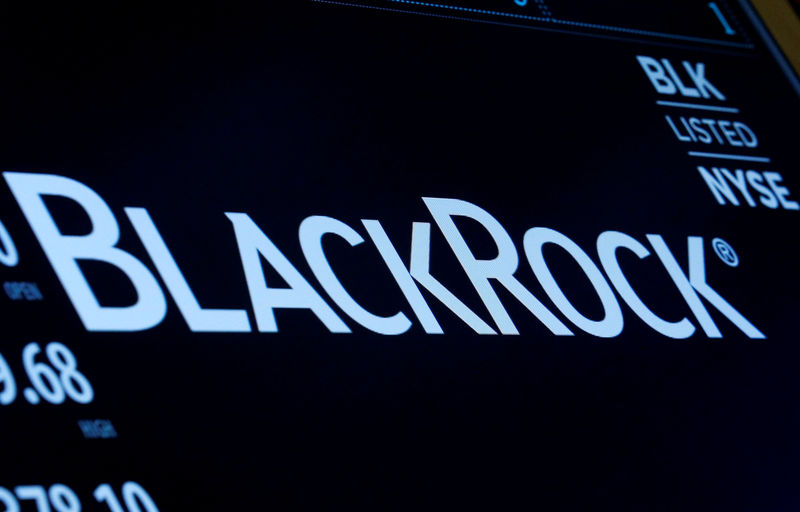By Trevor Hunnicutt
NEW YORK (Reuters) - BlackRock Inc (N:BLK), the world's biggest asset manager, on Wednesday reported double-digit profit gains as investors plowed money into lower-cost index funds, but the company's share price slipped as revenue fell short of analysts' expectations.
For graphic on BlackRock’s growth paradox, click: http://tmsnrt.rs/2pDik4d
Revenues of $2.8 billion came in 2 percent below analysts' estimates as advisory and distribution fees declined. Chief Executive Officer Larry Fink said the miss was not attributable to the fees it charges for managing funds.
Nonetheless, while BlackRock's assets grew 22 percent from a year ago to $5.4 trillion, fees for managing those assets and lending out the securities grew by a smaller 12 percent.
"There is a greater belief that long-term returns are structurally lower than they were 10 and 20 years ago," Fink told analysts on a conference call. "Fees take up a lot of that return. And as long as we believe the world is going to be in a low-return environment, our clients are under a lot of pressure.
BlackRock shares closed down 1.7 percent.
"They have a history of exceeding expectations," said Macrae Sykes, an analyst at Gabelli & Co, which owns BlackRock shares. "This quarter they didn't."
Investors poured $82.2 billion into its index funds and iShares exchange-traded funds during the first quarter, while its pricier active funds posted $1.8 billion in withdrawals.
Financial markets traded vibrantly last quarter as a new U.S. president and congress took office, and investors tried to size up whether they would pass tax and other reforms that could give new life to an aging bull market in U.S. stocks.
Investors increasingly are choosing to make those bets - whether optimistic or pessimistic - using ETFs that track indexes at a relatively low cost.
Very few companies in the industry have been able to build a successful index fund franchise like iShares, and the flight of customers to lower-cost products has consequently squeezed margins.
BlackRock's net income rose to $862 million, or $5.23 per share as its tax rate declined in the first quarter ended March 31, from $657 million, or $3.92 per share, a year earlier.
Excluding items, it earned $5.25 per share, beating the $4.89 estimate of analysts polled by Thomson Reuters.
PASSIVE
Last quarter, iShares and index funds brought in all of the net money that went into the BlackRock's "long-term" products, a grouping that excludes funds where investors park cash.
BlackRock has been pushing investors to use ETFs more often and in new ways. ETFs were initially seen as devices used to track stock indexes. But BlackRock has aggressively marketed fixed-income ETFs to institutions that normally use bonds.
That approach paid off. U.S.-based bond ETFs attracted record cash last quarter, according to researcher Morningstar Inc, and iShares took in $4 in $10 of that money.
BlackRock also created a low-cost lineup of 25 "Core" ETFs for everyday investors to use to build a basic portfolio. The funds compete on price with BlackRock's most aggressive price-slashing rivals, Vanguard Group and Charles Schwab Corp (N:SCHW).
Those 25 Core ETFs accounted for 54 percent of iShares inflows last quarter.
Yet success in that category has come at the cost of lowering fees, which BlackRock last did for Core in October.
In a sign of how high the bar is for growing in the ETF business, iShares' share of U.S. assets in that business has actually decreased to 39 percent, from a peak under BlackRock ownership of 47 percent. BlackRock bought iShares from Barclays PLC (L:BARC) in 2009.
ACTIVE
Last month, BlackRock said it would cut jobs and fees while relying more on computers to assemble its investment portfolios, a flurry of changes meant to jumpstart its lagging stockpicking franchise. The changes affect 11 percent of its $275 billion active stock fund business.
By BlackRock's own figures, 51 percent of assets in its traditionalist "Fundamental" active stock funds are lagging their benchmark over five years. That compares to 90 percent for BlackRock's data-driven "Scientific" funds and 88 percent for its taxable-bond funds.
It remains to be seen what effect the new changes will have. All else equal, cutting fees boosts performance.
But transferring management of some traditionalist funds to Scientific teams comes with its own risks, including scaring away existing investors, and creating a new reliance on computer models that may not deliver in increasingly competitive markets.

"They can't do anything about the environment for active management," said Tom Brakke, who consults asset managers.